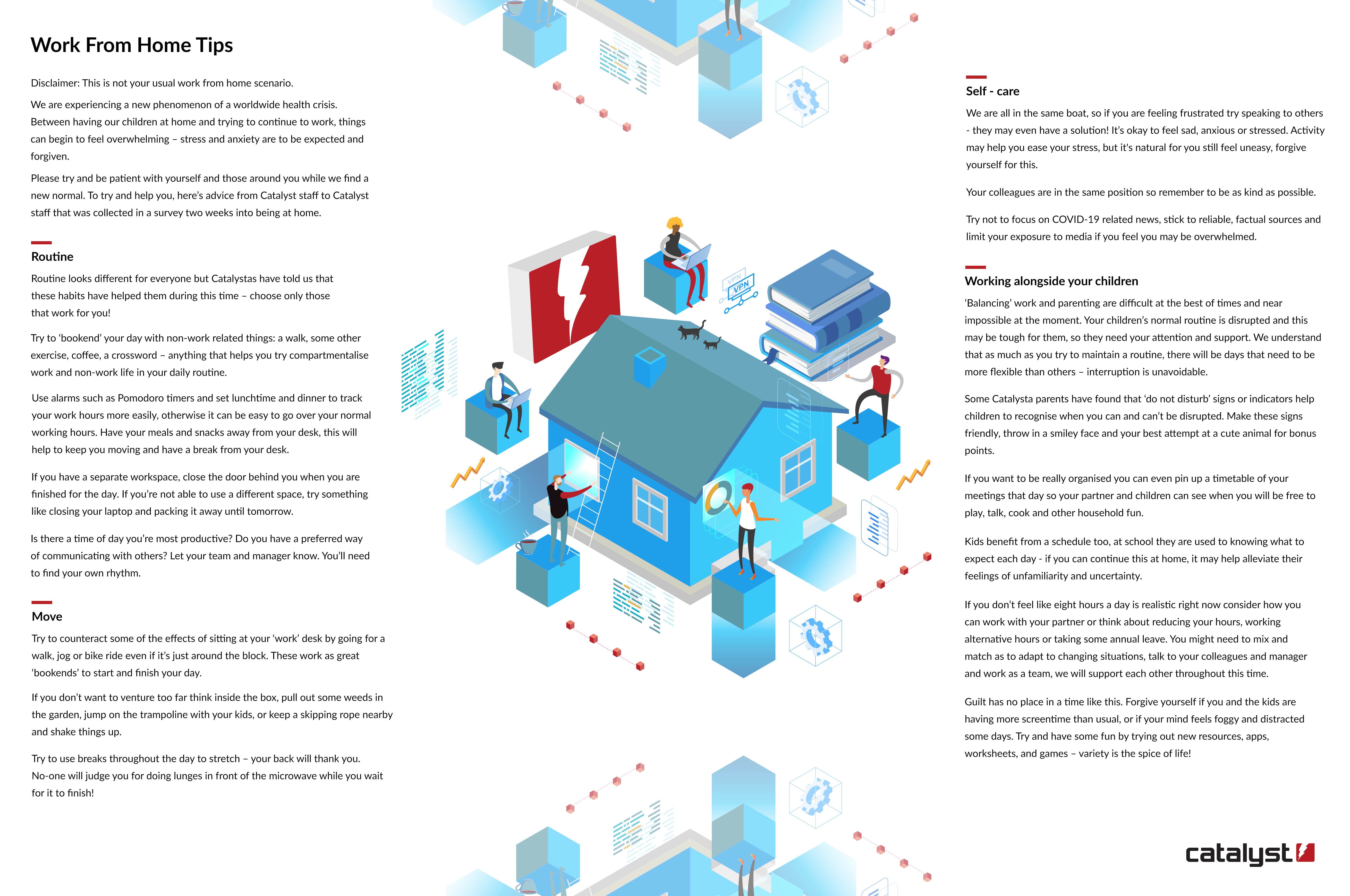by Chloe Gunn
At Catalyst, we have been conducting some very scientific research. Ok, so we just did a survey or two – but we have some very useful tips as a result of our (very scientific) results that may help you while we all work from home. This will be a two-part series accompanied by downloadable graphics. Firstly we are sharing tips and tricks for working at from home while maintaining some normality in your routine and daily life. Then, we will share our useful video call etiquette.
First things first, this is not your usual work from home drill. We are experiencing a new phenomenon of a worldwide health crisis. Between having our children at home and trying to continue to work, things can begin to feel overwhelming – stress and anxiety are to be expected and forgiven – please be patient with yourselves and those around you while we find a new normal.
Routine
Routine looks different for everyone but Catalystas have told us that these habits have helped them during this time – choose only those that work for you!
Try to ‘bookend’ your day with non-work related things: a walk, some other exercise, coffee, a crossword – anything that helps you try to compartmentalise work and non-work life in your daily routine.
Use alarms such as Pomodoro timers and set lunchtime and dinner to track your work hours more easily, otherwise it can be easy to go over your normal working hours. Have your meals and snacks away from your desk, this will help to keep you moving and have a break from your desk.
If you have a separate workspace, close the door behind you when you are finished for the day. If you’re not able to use a different space, try something like closing your laptop and packing it away until tomorrow.
Is there a time of day you’re most productive? Do you have a preferred way of communicating with others? Let your team and manager know. You’ll need to find your rhythm.
Move
Try to counteract some of the effects of sitting at your ‘work’ desk by going for a walk, jog or bike ride even if it’s just around the block. These work as great ‘bookends’ to start and finish your day.
If you don’t want to venture too far think inside the box, pull out some weeds in the garden, jump on the trampoline with your kids, or keep a skipping rope nearby and shake things up. TVNZ are partnering with Les Mills to do a daily workout on TVNZ, and on their OnDemand platform.
Try to use breaks throughout the day to stretch – your back will thank you. No-one will judge you for doing lunges in front of the microwave while you wait for it to finish, or try this short Tabata W.O.D.
Self-care
We are all in the same boat, so if you are feeling frustrated try speaking to others - they may even have a solution! It’s okay to feel sad, anxious or stressed. Activity may help you ease your stress, but it's natural for you still feel uneasy, forgive yourself for this.
We have found some useful mental health resources such as a general anxiety course, or this resource that advises how we can live with worry and anxiety during global uncertainty, and this website ‘Insight Timer’ that provides plenty of free content for mindful mediation – not forgetting children’s yoga!
Remember, your colleagues and friends are in the same position so be as kind as possible.
Try not to focus on COVID-19 related news, stick to reliable, factual sources and limit your exposure to media if you feel you may be overwhelmed.
Working alongside your children
‘Balancing’ work and parenting are difficult at the best of times and near impossible at the moment. Your children’s normal routine is disrupted and this may be tough for them, so they need your attention and support. We understand that as much as you try to maintain a routine, there will be days that need to be more flexible than others – interruption is unavoidable.
Some Catalysta parents have found that ‘do not disturb’ signs or indicators help children to recognise when you can and can’t be disrupted. Make these signs friendly, throw in a smiley face and your best attempt at a cute animal for bonus points.
If you want to be really organised you can even pin up a timetable of your meetings that day so your partner and children can see when you will be free to play, talk, cook and other household fun.
Kids benefit from a schedule too, at school they are used to knowing what to expect each day - if you can continue this at home, it may help alleviate their feelings of unfamiliarity and uncertainty.
If you don’t feel like eight hours a day is realistic right now consider how you can work with your partner or think about reducing your hours, working alternative hours or taking some annual leave. You might need to mix and match as to adapt to changing situations, talk to your colleagues and manager and work as a team, we will support each other throughout this time.
Guilt has no place in a time like this. Forgive yourself if you and the kids are having more screentime than usual, or if your mind feels foggy and distracted some days.
Try and have some fun by trying out new resources, apps, worksheets, and games – variety is the spice of life! Here are some ideas to get you started:
- Drawful 2 is a go-to party game that everyone can play and enjoy!
- Read some free ebooks from.
- You can always monitor the Royal Albatross Cam on the DOC feed.
If you like our graphic below, you can download it here.
